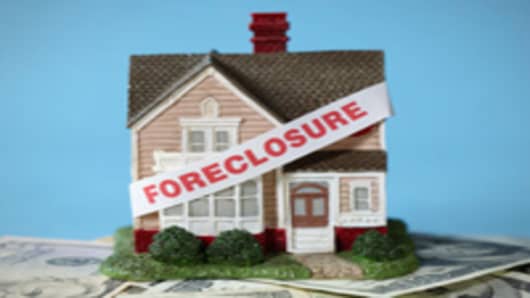The foreclosure mess is yet another blow to the already fragile housing market, but the consensus among most experts is that it won't derail a recovery—at least for now.
"It prolongs a housing recovery," says Greg McBride, senior financial analyst at Bankrate.com. "It's going to take some time to sort it all out and it does pose a threat to the whole economic system. But it's like an accident on the freeway. The traffic jam doesn't clear up when the cars are moved off the road."
The controversy—in which banks have been accused of shoddy and even fraudulent paperwork to evict thousands of Americans from their homes—couldn't have come at a worse time for the housing market.
Many big banks have suspended foreclosures until the problem is cleared up. And the mess has raised new fears about threats to bank earnings and the health of the housing market, which has been battered by falling prices and foreclosures of nearly three million homes since January 2007.
But few think this will lead to another housing crisis.
"The bigger banks are strong enough to go through this," Joseph Lavorgna, US chief economist at Deutsche Bank told CNBC on Friday. "They have tremendous loan-loss reserves, so they should be all right."
Big lenders like Bank of America and GMAC Mortgage have already said they will start processing foreclosures again. But the slowdown has just added more red tape to an already over-burdened system and increased the backlog of homes waiting to be foreclosed.
"Our structure was never designed to handle the millions of homes that went into foreclosure," says Bob Walters, chief economist at QuickenLoans.com. "We're playing catch up even more now than before."
Of course, there are some who think this could escalate into another credit debacle.
"It could be the start of another financial crisis," says Paul Dales, U.S. economist at Capital Economics. "It could go from housing to financial markets and into the wider economy. Remember, when the sub-prime crisis started, that didn't look like much either."
But most experts agree that the biggest roadblock to a housing recovery is the continued imbalance of supply and demand. Even with mortgage rates at historic lows and prices well below where they were just a few years ago, not enough homes are being sold.
"We've got too many houses on the market now with some 1.5 million homes up for sale," says Dales. "If you add on homes going through foreclosure process, you can add another 6-7 million. That's way too many."
The foreclosure mess will just prolong the slump. McBride points out the irony in all this—that lenders are now being criticized for trying to foreclose too quickly after being attacked for being too slow.
"Foreclosures piled up over the last two years as borrowers were defaulting faster than the process could handle and there was a back log," McBride added. "Now, lenders are being criticized for being too quick. Any slowdown in foreclosures just causes that back log to swell even further."
That delay in foreclosures will probably get worse as lenders sort through paper work and mortgage-backed securities come under the microscope, says James Keneally, a partner in the white-collar crime and litigation practice groups at the law firm Kelley Drye & Warren LLP.
"Future foreclosure actions will be scrutinized even more," Keneally says. "This will slow down the process for foreclosure sales now and going forward. There are the legal challenges from the state attorneys generals, the feds and consumers. You have to wonder what would happen if the entire foreclosure system broke down on what a mortgage is and what's securitized."
Another part of the paper trail is the issue of just who owns the mortgages under foreclosure, says Chris Herbert, director of housing studies at Harvard Univeristy.
"There's a big unknown in all this is about the chain of ownership for the loans," Herbert says. "Those courts that have to deal with foreclosures may need to go loan by loan to decide who has true ownership of the mortgage and who can legally foreclosure. Banks might not be able to say 'trust us' when it comes to ownership."
Helping to keep homes sales from taking off are the tougher underwriting regulations to get loans or to re-finance says Alan Rosenbaum, CEO of Guardhill Financial, a residential mortgage lending firm.
"We should roll the standards back to the 1990's and get a kick start for housing," Rosenbaum goes on to say. "The pendulum has swung too far the other way now. Lenders are demanding too much documentation from qualified borrowers. There was no underwriting on sub prime loans during the housing bubble and that was wrong. But those loans that did have good underwriting are performing well today. We should use those standards now."
But most think the real problem for housing is high unemployment and the uncertainty of the overall economysays Zandi.
"Housing's been in a free fall for almost five years and this robo signing issue just complicates things," Zandi says. "But it's the job market that needs improvement before housing gets better."



